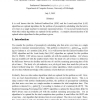120
click to vote
SWAT
2004
Springer
15 years 7 months ago
2004
Springer
It is well known that the Earliest-Deadline-First (EDF) and the Least-Laxity-First (LLF) algorithms are optimal algorithms for the problem of preemptively scheduling jobs that arr...
108
click to vote
SWAT
2004
Springer
15 years 7 months ago
2004
Springer
We consider the speed scaling problem of minimizing the average response time of a collection of dynamically released jobs subject to a constraint A on energy used. We propose an ...
123
click to vote
SWAT
2004
Springer
15 years 7 months ago
2004
Springer
We show that any priority queue data structure that supports insert, delete, and find-min operations in pq(n) time, when n is an upper bound on the number of elements in the prio...
SWAT
2004
Springer
15 years 7 months ago
2004
Springer
In this paper, we consider the problems of generating all maximal (bipartite) cliques in a given (bipartite) graph G = (V, E) with n vertices and m edges. We propose two algorithms...
SWAT
2004
Springer
15 years 7 months ago
2004
Springer
Given an edge-distance graph of a set of suppliers and clients, the bottleneck problem is to assign each client to a selected supplier minimizing their maximum distance. We introdu...
109
click to vote
SWAT
2004
Springer
15 years 7 months ago
2004
Springer
The first polynomial time algorithm (O(n4 )) for modular decomposition appeared in 1972 [8] and since then there have been incremental improvements, eventually resulting in linear...
SWAT
2004
Springer
15 years 7 months ago
2004
Springer
106
click to vote
SWAT
2004
Springer
15 years 7 months ago
2004
Springer
For a collection F of d-variate piecewise linear functions of overall combinatorial complexity n, the lower envelope E(F) of F is the pointwise minimum of these functions. The min...
104
click to vote
SWAT
2004
Springer
15 years 7 months ago
2004
Springer
We consider delay management in railway systems. Given delayed trains, we want to find a waiting policy for the connecting trains minimizing the weighted total passenger delay. If...
104
click to vote
SWAT
2004
Springer
15 years 7 months ago
2004
Springer
Abstract. We study the gossiping problem in directed ad-hoc radio networks. Our main result is a deterministic algorithm that solves this problem in an n-node network in time O(n4/...





